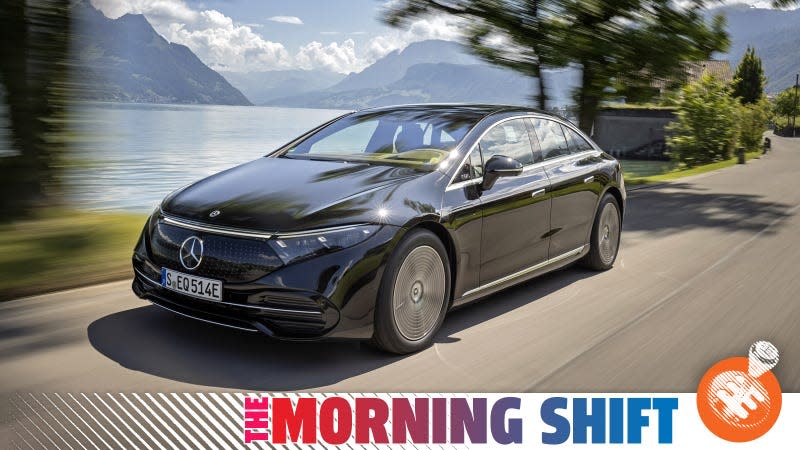Mercedes Says Law Is Preventing EV Performance Boost Subscriptions in Europe

Mercedes-Benz can’t offer its controversial new performance subscriptions in Europe, Volkswagen is looking for a partner for its future electric trucks, and the EV picture continues to be a lot less convincing across large swaths of the country where infrastructure is especially dire. All that and more in this Tuesday edition of The Morning Shift for November 29, 2022.
1st Gear: Europe Was Always Better at Consumer Advocacy Anyway
By now you may have caught wind of Mercedes’ wonderful idea to allow owners of EQ models to unlock more horsepower through a yearly subscription. It costs $1,200 and, depending on the particular model, could reduce 0-60 times by as much as nine-tenths of a second. Mercedes can get away with that here in the States, but overseas, it’s running into some headwinds, as Top Gear Netherlands recently reported. Translated, the article reads:
Read more
In the US, Mercedes customers can increase the assets of their EQE or EQS software-wise for an amount of $1,200 a year. We expected this subscription to come to the Netherlands soon, but apparently it is not allowed by European legislation at the moment.
A spokesperson for Mercedes Netherlands reports to TopGear that the American colleagues are indeed offering more power through a subscription. In Europe, Mercedes will not yet offer subscriptions to add extra horsepower to electric models. The spokesperson says it ‘depends on legal matters.’
In the US, there are no legal objections to the subscriptions, but in Europe the legal department has yet to get started. In terms of content, Mercedes cannot yet say much about it, except that the fact that it is about engine power creates legal obstacles. Something BMW has no problems with with the seat heating subscription.
There are actually legislative challenges brewing in the U.S., but nothing in the books yet. They also have fallen on individual states to fight thus far, like New Jersey.
It’s unclear precisely why Mercedes can’t offer the power increase on a subscription basis in Europe, as the spokesperson declined to explain the issue to Top Gear. Top Gear does rightly point out, however, that competitors like Polestar can ship their cars from the factory with the same internals and different performance metrics, so long as it charges for the power/range difference up front, rather than down the line in the form of a recurring payment.
2nd Gear: Volkswagen Might Help Foxconn Make Cars
Foxconn has been in the news for every wrong reason lately, but Volkswagen seems undeterred. The German automaker is considering a partnership with the Chinese electronic manufacturing giant to build its Scout SUVs and trucks, Automobilwoche reported Tuesday. Foxconn currently produces Lordstown electric trucks out of the Ohio factory it purchased last year. Via Automotive News:
VW is in talks with Foxconn for the Taiwanese contract manufacturer to build Scout vehicles, Automotive News sister publication Automobilwoche has learned from VW sources.
Foxconn, best known as the manufacturer of the Apple iPhone, started manufacturing Lordstown’s Endurance pickups in September after buying the company’s Ohio facility bought by Lordstown from General Motors in 2019.
VW said in May it plans to revive the long dormant Scout off-road nameplate that it acquired last year when its heavy-truck brand merged with Navistar.
Foxconn last month unveiled two new electric vehicles prototypes highlighting its ambitions to become a major car manufacturer, replicating its success in electronics assembly as Apple’s biggest manufacturing partner. A partnership with VW could give Foxconn a major breakthrough.
If Foxconn doesn’t work out, Volkswagen has been chatting with Magna Steyr too. Everyone chats with Magna at one point or another.
3rd Gear: EVs and Middle America
It’s no secret that rural areas and electric vehicles don’t mix, or at least haven’t yet. A recent study from S&P Global suggests that only 16 percent of the country’s EVs are registered in 22 non-costal “heartland” states, like Wyoming, North Dakota and Arkansas. Once again, Automotive News:
Among the states in the S&P study, Wyoming and North Dakota had the lowest national EV share, at essentially 0 percent in the January to August period. Wyoming had 146 EV sales in the period while North Dakota had 143.
As a group, EV adoption was both low and stagnant among the 22 states compared with coastal states.
“While the heartland states represent 27.1 percent of total U.S. vehicle retail sales through August, their representation in EV adoption has remained stagnant from 2021 into this year at a tepid 15.5 percent share,” S&P Global said. “Only Colorado and Nevada (and to a minuscule extent, Utah) out-punch their overall retail share in EV representation.”
The primary issue would appear to be the lack of charging availability, which the Infrastructure Investment and Jobs Act is meant to alleviate. The emergence of all-electric utility vehicles, particularly pickup trucks, may help things along too. Last year I cold-called an Oklahoma Ford dealer playing an uninformed buyer interested in EVs that had questions about the Mustang Mach-E. The poor salesman seemed confused more than anything else.

 Yahoo Autos
Yahoo Autos 